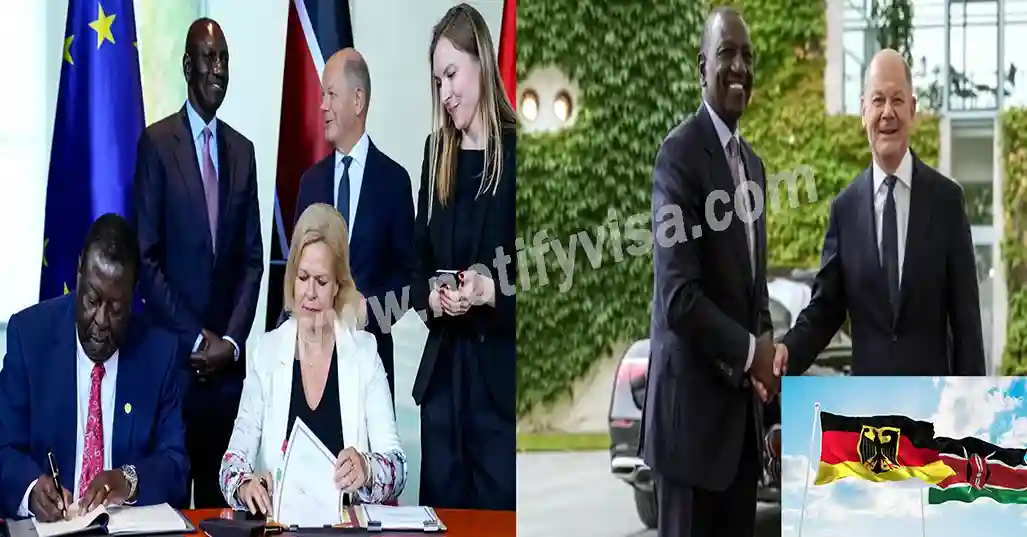Berlin agreed to a regulated and targeted labor migration agreement that will permit skilled and semi-skilled Kenyan workers to enter Germany.
While Germany is experiencing a labor shortage, Kenya is finding it more and more difficult to provide jobs and a living wage for its young professionals.
The agreement does not define how many workers will be allowed entry, according to the German government.
The German government’s efforts to reduce immigration are based primarily on migration agreements.
Additionally, the accord will make it easier for Kenyans living in Germany without authorization to return home.
Check Also: 1,500+ UK Work Visa Sponsorship Jobs Available in September 2024
As part of an experimental effort, Flensburg, in northern Germany, has already welcomed five bus drivers from Kenya.
Due to the surge in popularity of the far-right anti-immigration party Alternative for Germany (AfD) immigration is currently a major topic in Germany.
In recent years a comparatively substantial number of asylum seekers have been allowed to settle in Berlin by successive governments.
During the 2015–2016 migration crisis, Germany took in over a million individuals most of whom were escaping war in places like Syria. Since Russia’s full-scale invasion started in February 2022, Germany has also taken in 1.2 million Ukrainian refugees.
Kenyan President William Ruto and German Chancellor Olaf Scholz signed the labor agreement in Berlin.
To help Kenyans find work in the largest economy in Europe Germany decided to relax some of its immigration regulations.
Berlin authorities are also thinking about giving temporary residency permits to Kenyan laborers who have been hired.
Long-term visas for study or vocational training in Germany will also be granted to Kenyans.
Berlin agreed to a regulated and targeted labor migration agreement that will permit skilled and semi-skilled Kenyan workers to enter Germany.
While Germany is experiencing a labor shortage, Kenya is finding it more and more difficult to provide jobs and a living wage for its young professionals.
The agreement does not define how many workers will be allowed entry, according to the German government.
The German government’s efforts to reduce immigration are based primarily on migration agreements.
Additionally, the accord will make it easier for Kenyans living in Germany without authorization to return home.
As part of an experimental effort, Flensburg, in northern Germany, has already welcomed five bus drivers from Kenya.
Due to the surge in popularity of the far-right anti-immigration party Alternative for Germany (AfD) immigration is currently a major topic in Germany.
In recent years a comparatively substantial number of asylum seekers have been allowed to settle in Berlin by successive governments.
During the 2015–2016 migration crisis, Germany took in over a million individuals most of whom were escaping war in places like Syria. Since Russia’s full-scale invasion started in February 2022, Germany has also taken in 1.2 million Ukrainian refugees.
“When the long-stay visa expires Kenyans can get a temporary residence permit to study in Germany for up to two years,” according to the paperwork.
It further states that the temporary residency permit may be renewed if the intended use of the space has not yet been fulfilled but can be in a “reasonable” amount of time.
As per the agreement, IT experts from Kenya would be permitted to travel to and work in Germany without the need for official certification.
If skilled people complete their university education or vocational training and their qualifications are accepted by the appropriate authorities of the other party, both governments will encourage their immigration.
Provisions for the readmission and return of citizens between the two countries are also included in the agreement.
It provides instructions on how to stop and combat forced work, human trafficking, and labor exploitation.
Schleswig-Holstein’s Transport Minister Claus Ruhe Madsen stated that Germany needed ingenious brains and hard-working hands as he welcomed five drivers from Kenya on Thursday in Flensburg.
“We just need to make Germany appealing for people to come here,” Madsen stated.
As part of a trial project, the Aktiv bus business will teach the first group of Kenyan workers who want to work in Germany as drivers.
Among those anticipated to participate in the initiative are teachers, doctors, and nurses.
The agreement is anticipated to considerably improve Kenyan workers’ access to respectable international jobs in Germany and alleviate the country’s workforce shortage, according to the International Workforce Organisation (ILO).
“It includes mechanisms to protect the rights and welfare of Kenyan migrant workers in Germany, guaranteeing safe, orderly, and productive migration,” the ILO stated in a statement.
However, professional workers such as doctors and nurses are leaving Kenya for employment overseas, creating a severe lack of medical personnel in local hospitals, and raising fears about a brain drain.
The BBC’s Newsday program quoted Kenyan lawmaker and lawyer Ekuru Aukot as saying, “It is sad that we are going to service other countries at the expense of our own country.”
Nonetheless, senior foreign affairs officer Roseline Njogu claimed Kenya was only meeting the demands of the global employment market.
Every year, a million new individuals enter the Kenyan employment market, contributing to the country’s youthful bulge. “To create job opportunities at home, it takes time and resources,” the speaker continued.




One thought on “Kenya and Germany Partner to Fill Job Gaps with Skilled Workers”